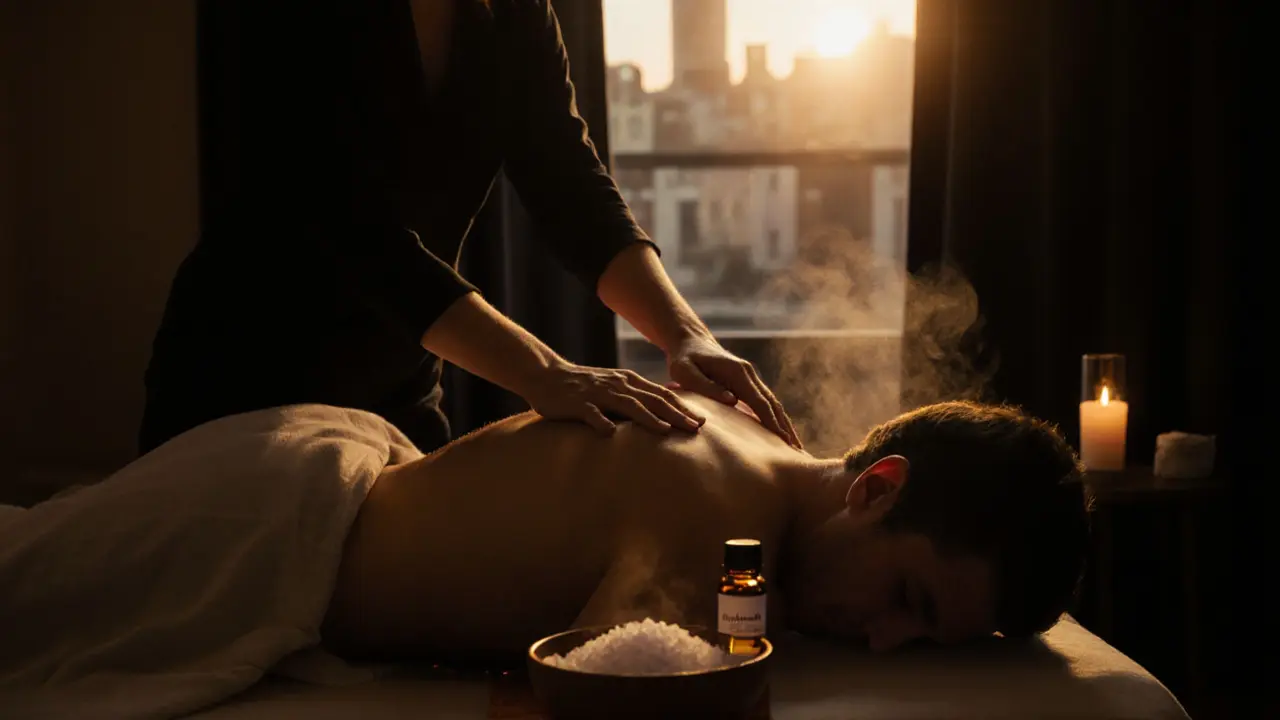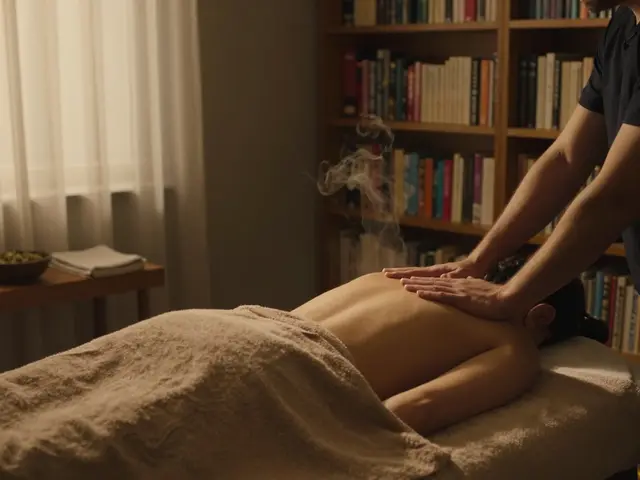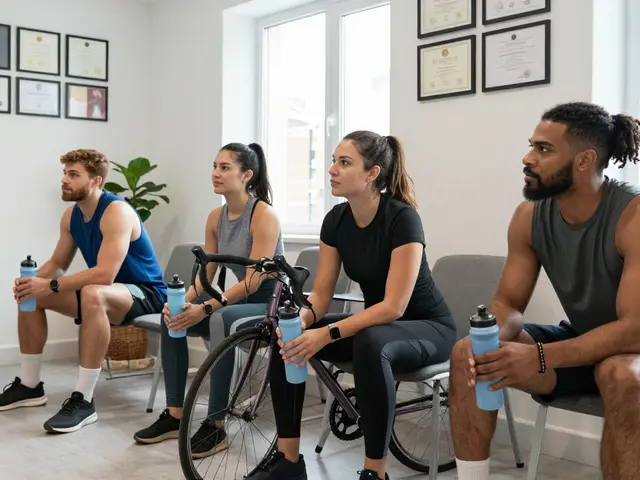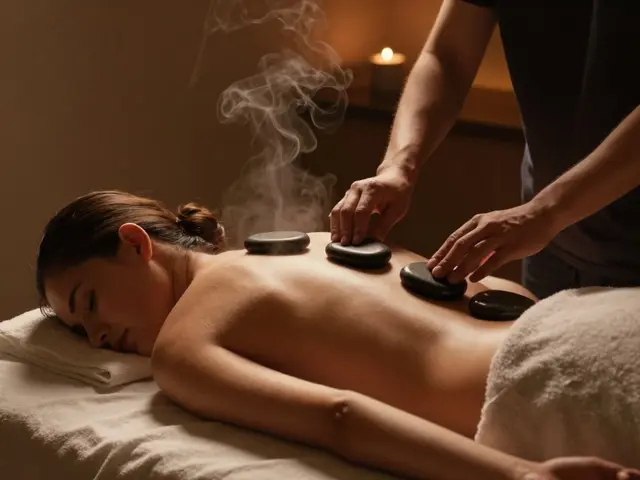Feeling constantly tired, tense, or overwhelmed? You’re not alone. In London, where the pace never slows and the noise never stops, your body is paying the price. Chronic stress doesn’t just live in your mind-it shows up as tight shoulders, aching lower back, or sleepless nights. A good massage isn’t a luxury. It’s a reset button for your nervous system.
Why Massage Works in a City That Never Sleeps
Londoners spend an average of 47 minutes commuting each day. That’s nearly 400 hours a year stuck in traffic, on packed Tube trains, or walking fast just to keep up. Your muscles don’t get a chance to relax. Adrenaline stays high. Cortisol builds up. Massage therapy directly counters this. Studies from the Journal of Clinical Psychiatry show that a single 60-minute session can lower cortisol levels by up to 31%. That’s not a guess-it’s measurable. And it doesn’t require pills, apps, or expensive gear. Just hands, pressure, and time.
Massage increases blood flow, flushes out lactic acid, and triggers the release of endorphins. These aren’t just feel-good chemicals-they’re your body’s natural painkillers. You don’t need to believe in ‘energy flow’ or ‘chakras’ to feel the difference. You just need to lie down, breathe, and let someone else take over the work.
What Kind of Massage Actually Helps?
Not all massages are the same. Walking into a spa in Covent Garden and choosing ‘relaxation’ because it sounds nice won’t fix a neck that’s been tight since your last Zoom meeting. Here’s what works, based on what London therapists actually see day after day:
- Swedish massage-Best for beginners or if you’re just looking to unwind. Long, flowing strokes, light to medium pressure. Ideal after a long week.
- Deep tissue massage-Targets chronic tension. If your shoulders feel like concrete or your lower back aches when you sit for more than 20 minutes, this is your go-to. It’s not about pain-it’s about precision. A good therapist works slowly, layer by layer.
- Trigger point therapy-Focuses on knots. That one spot in your upper back that makes you wince when you reach for your coffee? That’s a trigger point. This technique releases it with focused pressure.
- Myofascial release-Works on the connective tissue surrounding muscles. Great for people who’ve had injuries, sit at desks all day, or feel stiff even after stretching.
Most London clinics offer a 15-minute consultation before your first session. Use it. Tell them exactly where you hurt, how long it’s been going on, and what you hope to feel afterward. Don’t say ‘just make me feel better.’ Say ‘my right shoulder locks up when I type’ or ‘I can’t sleep because my hips ache.’ Specificity gets better results.
Where to Find Real Massage Therapy in London
There are hundreds of places offering ‘massage’ in London. But not all of them are staffed by qualified therapists. Look for these signs:
- The therapist holds a qualification from a recognized body like ITEC, VTCT, or CMA.
- The clinic lists their therapists’ names, photos, and training backgrounds-not just ‘our expert team’.
- They don’t push add-ons like ‘detox foot baths’ or ‘crystal healing’ as part of the treatment.
- They ask about your medical history. If you’ve had surgery, are pregnant, or have nerve damage, they need to know.
Some trusted names in London include Bodywell Clinic in Notting Hill, The London Massage Company in Shoreditch, and Spa 360 in Camden. But don’t just pick the most expensive or the one with the fanciest website. Read reviews that mention specific results: ‘My sciatica improved after three sessions,’ not ‘The candles were nice.’

How Often Should You Get a Massage?
There’s no one-size-fits-all answer. But here’s a simple rule based on real-life outcomes:
- If you’re stressed but not in pain: once a month.
- If you have ongoing tension (desk job, driving, parenting): every two weeks.
- If you’re recovering from an injury or intense physical activity: weekly for 4-6 weeks, then taper off.
Think of it like brushing your teeth. You wouldn’t wait until your gums bleed to start. Same with massage. Waiting until you’re in agony means you’re treating the symptom, not preventing it. A regular massage routine keeps your muscles supple, your posture stable, and your stress response calmer.
What to Expect During Your First Session
You don’t need to prepare much. Just wear something comfortable. Most therapists provide disposable underwear or towels-you won’t be fully naked unless you choose to be. The room will be warm, quiet, and dim. Music is usually soft, but you can ask for silence.
The therapist will leave the room while you get settled. When they return, they’ll check in: ‘Where do you want the most focus?’ ‘Any areas to avoid?’ Then they’ll start. You should feel pressure, but not sharp pain. If it hurts, say so. A good therapist adjusts immediately.
Afterward, drink water. You’ll feel relaxed, maybe a little sore the next day-that’s normal. Don’t rush into a meeting or a run. Give yourself 20 minutes to settle. Many people nap after their first session. That’s not laziness. That’s your nervous system finally hitting pause.
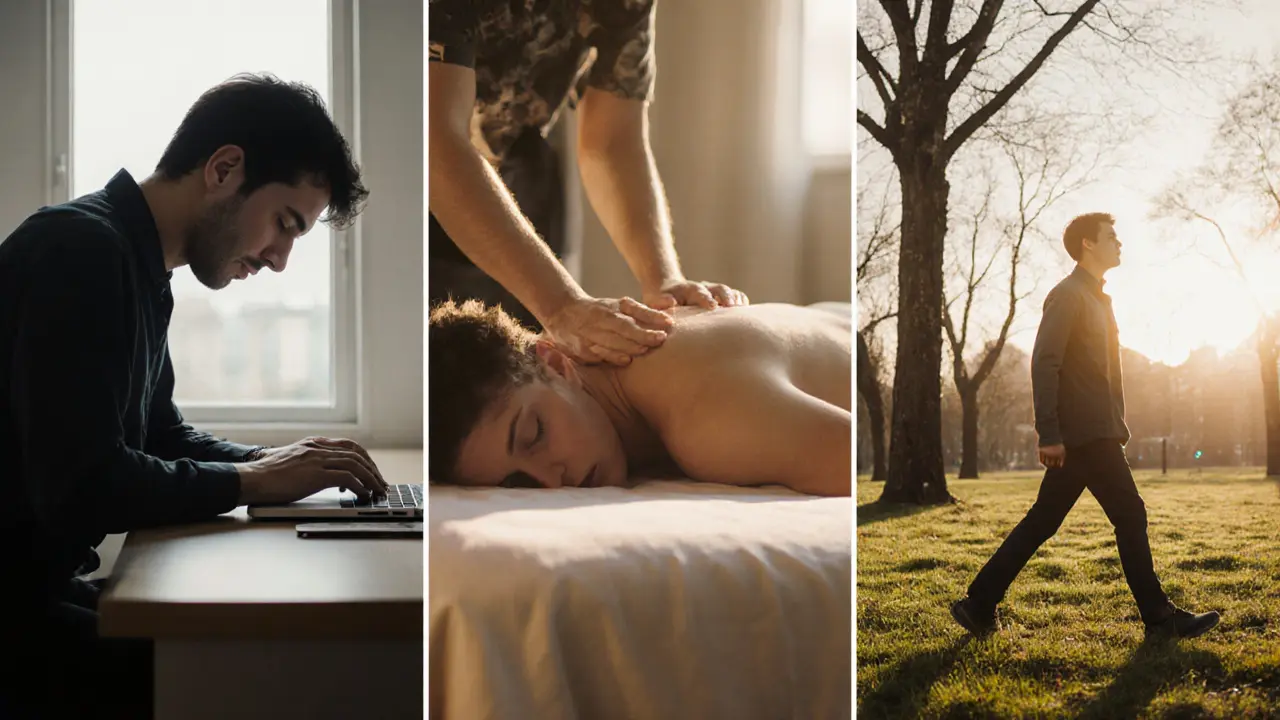
Massage Isn’t a Quick Fix. It’s a Habit.
One massage won’t cure your chronic back pain. But three a month? That changes your baseline. Your body learns what it feels like to be relaxed. Your mind starts to trust that rest is possible. Over time, you sleep deeper. You react less to stress. You move with less stiffness.
People who make massage a regular part of their life don’t just feel better-they perform better. They’re more focused at work. Less irritable with their kids. More present in conversations. It’s not magic. It’s physiology.
London doesn’t slow down. But you don’t have to keep up. You just need to know how to reset.
DIY Tips to Extend the Benefits
You can’t get a professional massage every day. But you can stretch the effects:
- Use a foam roller on your back and thighs for 5 minutes after work.
- Place a tennis ball against the wall and roll it under your shoulder blade for 30 seconds per side.
- Take a warm bath with Epsom salts twice a week. Magnesium helps muscles relax.
- Set a phone reminder to roll your shoulders every hour if you sit all day.
These aren’t replacements. They’re support systems. They keep your body from slipping back into tension between sessions.
Can massage help with anxiety?
Yes. Massage lowers cortisol and increases serotonin and dopamine-chemicals linked to mood regulation. A 2023 study in the International Journal of Neuroscience found that participants with moderate anxiety saw significant improvement after eight weekly massage sessions. It doesn’t replace therapy, but it creates space for calm.
Is deep tissue massage painful?
It shouldn’t be. Deep tissue means working deeper into muscle layers, not applying more force. You might feel a strong sensation, but it should never feel like a sharp stab or burning. If it does, speak up. A good therapist works with your body’s response, not against it.
Can I get a massage if I’m pregnant?
Yes-but only with a therapist trained in prenatal massage. Regular massage techniques can be unsafe during pregnancy. Look for clinics that specifically offer prenatal sessions. They’ll use special pillows and avoid pressure points that could trigger contractions.
How much should a massage cost in London?
Prices vary by location and therapist experience. A 60-minute session typically costs between £50 and £90. Anything below £40 often means the therapist is underpaid or unqualified. Anything above £120 is usually for luxury spas with added extras. Focus on qualifications, not price tags.
What if I don’t like being touched?
That’s completely valid. Many people feel this way. Some clinics offer chair massages (you stay clothed) or remote techniques like Reiki or acupressure. Others let you keep your underwear on or use a towel as a barrier. Tell them upfront. A good therapist will adapt.
Next Steps: Start Small, Stay Consistent
You don’t need to book a full hour right away. Try a 30-minute session focused on your neck and shoulders. See how you feel. If it helps, book another. Then another. Build the habit like you would with walking or drinking more water. It’s not about perfection. It’s about showing up-for yourself.
London moves fast. But your body doesn’t have to keep pace. Sometimes, the most powerful thing you can do is lie still and let someone else take care of you-for just one hour.
